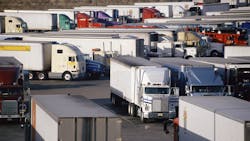When the U.S. Supreme Court late last month refused to consider an appeal challenging a California law restricting the use of owner-operators, the question among industry experts wasn’t whether this would impede operations in the Golden State, but to what degree.
California Assembly Bill 5 (AB5) set forth a three-pronged legal test for independent contractors that, if failed, would require employers to hire these contractors as employees. The bill was originally intended to affect "gig" economy workers, such as rideshare and food-delivery drivers, and while there are many professions exempted from the law, truck driving is not among them.
The owner-operator model as it has existed for decades does not meet this test, but a preliminary injunction was issued by the U.S. Southern District Court of California to allow truck drivers to act as independent contractors during ensuing litigation from the California Trucking Association. However, with the Supreme Court opting to decline the appeal from the 9th Circuit, the district court must repeal the injunction, rendering AB5 applicable to truck drivers.
Uncertainty in the law
As carriers attempt to navigate restrictions, perceived violations of the law will still need to be litigated on a case-by-case basis. As AB5 is not specific to any one industry, there’s uncertainty as to how trucking operations can be tweaked to meet the law’s requirements.
“California has provided no guidance to owner-operators about how they can work as independent contractors under this new scheme,” according to a statement from the Owner-Operator Independent Drivers Association (OOIDA), “and truckers will be at the mercy of the courts to interpret how the law will be applied.”
See also: June FMCSA data shows accelerated fleet failures
Many carriers, anticipating that AB5 would eventually be applied to trucking, have converted contractors to employees. Other carriers have searched for alternative solutions. Some might, if they haven’t already, establish a brokerage arm and get drivers, who will need their own operating authority, to haul freight. This would be an attempt to satisfy the requirement from AB5 that the contractor must perform “work that is outside the usual course of the hiring entity’s business.”
Another possibility is a “two-check” model. One payment is made to the driver as an employee and another is paid for the use of the truck, which allows carriers to keep from having to buy trucks outright. This option is less appealing to carriers, who would have to pay all employee benefits required by the state of California. It would, however, allow a quick transition to a compliant model using the owner-operators with whom they already have relationships.
A weak link in the supply chain
Last year’s images of cargo ships backed up along California ports still loom in the minds of many as those in the industry worry that the restrictions on owner-operators out west “will only serve to expand upon this country’s supply chain crisis,” as Truckload Carrier Association (TCA) President Jim Ward put it. Drayage, the transport of cargo from ocean vessels, could be particularly affected, as a large portion of those drivers traditionally have operated as independent contractors.
See also: Out-of-sync supply chains are changing trucking
The past year has been difficult for owner-operators nationally due to high fuel prices and less favorable spot-market rates, leading to many drivers quitting the industry. Many are wondering if the enactment of AB5 will accelerate this trend.
“There's no way around the idea that we're going to lose capacity,” said Avery Vise, VP of trucking for FTR. “There are going to be some operations that just say, 'I can't deal with this. I'm just going to leave California or I'm going to shut down altogether.'”
While a short-term drop in capacity is inevitable, Avery did add that, if drivers leave the state, there will be others to take advantage of the opportunity to haul their freight, and that for most truckers, “if you've gone to the trouble of buying a truck, it seems unlikely to me that your next step is to get out of the trucking industry altogether.”
The legislation likely will hamstring the operations of smaller carriers more than larger ones, as smaller companies have less ability to hire and manage personnel and pay the requisite benefits.
“I think the net of this is that we'll see impact on the smaller end of the market, but not so much in the overall market,” said Dean Croke, principal analyst for DAT Freight & Analytics. “I think a lot of the bigger companies have already realigned their fleets to be compliant with this knowing that there was a high probability this would occur.”
Opponents of AB5 argue that, while its goal is to aid workers, the law could hamper economic opportunity and social mobility for the very classes it intends to protect.
“The industry is always looking for qualified drivers,” said Dave Heller, TCA’s senior vice president of safety and government affairs, “but we're eliminating the one thing that is key to this whole thing, is that independent contractors are independent contractors because they want to be, not because they're being forced into this business model. They want to be their own businessperson.”
See also: ACT joins other analysts in seeing odds of recession growing
Legal analysts note that bills like AB5 can have a sort of domino effect, where other states adopt laws with similar language.
"There are certainly a few states that have already drafted bills," said Greg Feary, president and managing partner at Scopelitis Transportation Consulting. "Senate Bill 863 in New Jersey is one example. That was modeled off after AB5 . It has been in front of the state legislature twice now. It has not gone through, but it might go through."
AB5 brings uncertainty to trucking’s economy in already-uncertain times, and trucking advocates plan to continue legal challenges or lobbying for new legislation, with an OOIDA statement saying, "We know this will not be last word on the legality of AB5 and expect to participate in future challenges to the law."
“There's this sort of philosophical division between the trucking industry and the state of California that you can't get past,” Vise added, “because one side is, ‘You’re forcing us to do this. This is going to cause us to have all these costs,’ and California is saying, ‘Yep, that's our goal. That's what we want.’ And so that's just not reconcilable.”
About the Author
Scott Keith
Scott Keith is a former fleet owner digital editor, who was on staff from 2022 to 2023.

